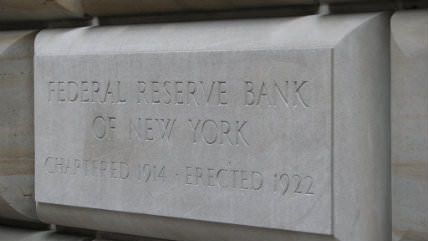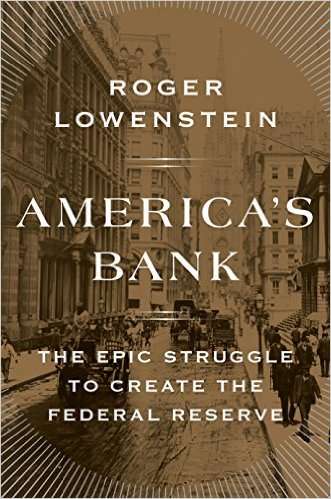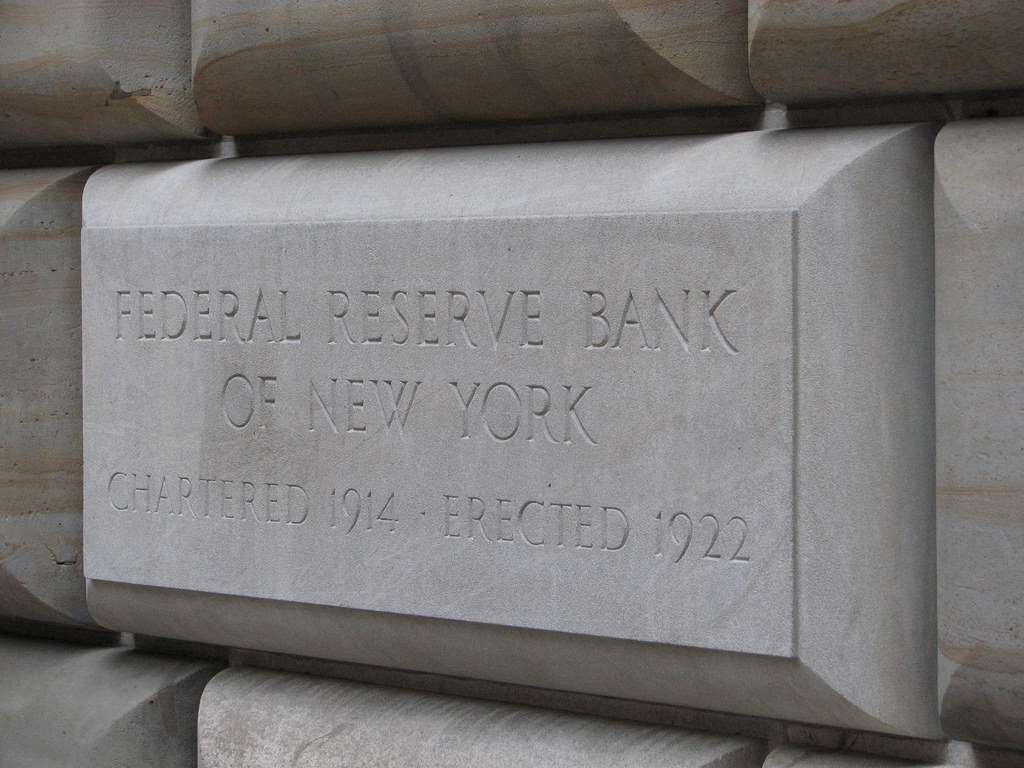Citigroup Executive Reviews Book on the Federal Reserve
An executive whose bank faltered while he was highly compensated reviews a book on the Fed for the New York Times.


The publication this week of a new history of the founding of the Federal Reserve Bank might provide an opportunity for an objective reevaluation of whether the American central bank, as created by the Federal Reserve Act in 1913, was a good idea. Alas, if The New York Times book review's handling of the story is any example, there will be no such look.
Sunday's Times featured a review by Robert E. Rubin of Roger Lowenstein's new book, America's Bank: The Epic Struggle to Create the Federal Reserve. The Times identifies the reviewer as "a co-chairman of the Council on Foreign Relations" who "was Treasury secretary from 1995 to 1999." Unmentioned is Rubin's role as chairman of the executive committee of Citigroup during a period when that bank required a taxpayer-funded rescue. Rubin was reportedly earning a Citigroup salary of $1 million a year and a $14 million annual "guaranteed bonus," compensation that totaled from 1999 to 2009 about $126 million. The Times identification also omits Rubin's service on Harvard's small governing board, the Harvard Corporation, at a time when Harvard lost $1 billion betting incorrectly, mostly against JPMorgan Chase, on the direction of future interest rates.
Rubin's article would be problematic even if it had been written by an unknown freelancer. But understanding Rubin as a bank executive whose bank faltered while he was highly compensated puts the Times article, and its view of the Fed, in a different context.
The review is a rehash of the standard pro-Fed arguments. The same talking points can also be found in the recent memoir by Ben Bernanke, modestly titled, The Courage To Act. Rubin makes reference to "the ferocious panic of 1907." As ferocious as that panic was, it somehow seems to have receded in memory in comparison to the Great Depression and the financial crisis of 2008, both of which occurred notwithstanding the existence of the Federal Reserve set up in part to prevent panics.
The Times review refers to "the immigrant financier Paul Warburg, virtually forgotten today." Not by anyone who read Ron Chernow's wonderful book The Warburgs.

Rubin's big miss, though, comes in a paragraph that blames the Fed's inaction for bank failures in the 1930s and for inflation in the 1970s. He writes, "During the early years of the Great Depression, for example, instead of using its lender-of-last-resort powers, the Fed stood by while roughly 40 percent of America's banks failed. And these bank failures contributed greatly to the severity and duration of the Depression."
Yet an economist at Columbia University, Charles Calomiris, notes that one reason the banks were failing was what he calls "currency risk":
Depositors had reason to fear that President Roosevelt would leave the gold standard, which gave them a special reason to want to convert their deposits into (high-valued) dollars before devaluation of the dollar.
Calomiris writes:
Many commentators have faulted the Federal Reserve for failing to prevent bank failures with more aggressive discount window lending. While it is certainly true that expansionary monetary policy, particularly in 1929-31, could have made an enormous difference in preventing bank distress (through its effects on macroeconomic fundamentals), that is not the same as saying that more generous terms at the discount window (holding constant the overall monetary policy stance) would have made much of a difference. Discount window lending only helps preserve banks that are suffering from illiquidity, which was not the problem for most banks in the 1930s that were experiencing large depositor withdrawals.
Similarly, blaming the Fed for the inflation of the 1970s lets off the hook Richard Nixon. Nixon ended the convertibility of the dollar to gold, a decision that helped to set off the great inflation.
Rubin's Times review also touts the importance of "protecting the independence of the Fed from political influence." Independence from political influence is a nice way of saying "unaccountable in a democracy."
If all this sounds arcane or abstruse, it's too bad, because money is too important to be left to bankers. A lot of those who lost their jobs or their home in the 2008 financial crisis did not land as pleasantly as has Rubin. Perhaps if the Fed were less "independent," their voices, not Rubin's, would be the ones passing judgment on the central bank's performance, or even on its existence.
Editor's Note: As of February 29, 2024, commenting privileges on reason.com posts are limited to Reason Plus subscribers. Past commenters are grandfathered in for a temporary period. Subscribe here to preserve your ability to comment. Your Reason Plus subscription also gives you an ad-free version of reason.com, along with full access to the digital edition and archives of Reason magazine. We request that comments be civil and on-topic. We do not moderate or assume any responsibility for comments, which are owned by the readers who post them. Comments do not represent the views of reason.com or Reason Foundation. We reserve the right to delete any comment and ban commenters for any reason at any time. Comments may only be edited within 5 minutes of posting. Report abuses.
Please to post comments


The reason the depression lasted as long as it did is because market signals were disconnected and no one had a clue as to what the Roosevelts were going to unleash next.
We are effectively caught in the same vacuum of inaction. We have no idea what other bright ideas will be coming along from the Central Planners. Most businesses I'm aware of are spending way too much time trying to navigate Obamacare, and don't full trust the "recovery" to invest. And so we limp along. What I have been noticing is a precipitous selling out of small business to bigger businesses. The "diversity" of the productive sector is drying up. I don't have a problem with decisions made with an uncoerced market, but I think a lot of small companies ($50M and under) are just saying "fuck it" and the ownership simply cashing out what they can. There will likely always be the very small "businesses" which are simply contract laborers who form a shell, but that's simply form and not function.
cont-
But the net result is a lack of a "market" determining what risks to take, how to navigate the efficient supplying of consumers' needs and wants. We have collectivists making terrible choices based on prior terrible choices and people throwing up their hands and giving up. We have hundreds of thousands of open jobs and just as many uninterested unemployed. We have broken nearly every market signal there is as people operate under the assumption that the endless cornucopia of goods and services will soon be cracked wide open and free shit will rain down. That's the support for Sanders - he's the key to the big box of free shit the white, curly mustached, monocle wearing gents are gleefully guarding to watch poor people squirm for their amusement.
I think the term you're looking for is "Libertarian Moment."
The book subtitle reads: The Epic Struggle To Create The Federal Reserve. It should read: The Epic Fraud That Created The Federal Reserve.
It does sound arcane and abstruse, which is a big reason, if not the main reason, why most Americans are ignorant about economics. Unfortunately, 'way too many free-market economists write this way as well. Two examples:
"The question of what, in comparative terms, is the cost of the use of the various possible technical means for a single technical end depends in the last analysis on their potential usefulness as a means to other ends."
Unless I miscounted, that sentence contains a 21-word complex subject. But even short sentences are unreadable for most of the population when they sound like this:
"Value is a subjective phenomenon that eludes cardinal quantification."
If that won't send you rushing to the barricades in defense of free enterprise, nothing will.
On the bright side, some of the younger Austrians, such as Mark Thornton and Tom Woods, write about economics in everyday, shirtsleeve American English, so all is not lost. Let's hope other free-market defenders will follow their example.
I would really like someone to write about how an alternative money system to the banks/Fed can be created when the next banking crisis happens. That is going to be the only opportunity to ever introduce monetary competition - and the window for it will be extremely short and filled with panic. Unless someone has an absolutely bulletproof detailed plan/legislation to get a workable alternative (covering deposit/transfer/settlement/etc - for individuals, payroll accounts, and smaller businesses) up and running in less than a week; the actual alternative will be what happened during TARP in 2008. The only existing system will start crashing and freezing - and bankers will then start threatening revolution and chaos if they don't get their trillion pounds of flesh yesterday.
"Unmentioned is Rubin's role as chairman of the executive committee of Citigroup during a period when that bank required a taxpayer-funded rescue."
From what I recall, the banks receiving TARP money were required by the government to take it, whether or not they needed it or wanted it. The strategy was to force all the major banks (or something to that effect) to take a bailout so that investors wouldn't know which ones were really in trouble.
Also, it's worth pointing out that the banks repaid their bailouts years ago. The feds lost about 10 or 11 billion clams on GM.
As I recall, pretty much the only major bank to push back on getting TARP funds was Wells Fargo. They got pushed into taking over Wachovia as well and got some special considerations for doing it. Part of the reason they were chosen to take Wachovia is that they were in better shape.
Citi on the other hand, was about to crash and burn. The balance sheet was a mess and they had a shell company holding tons of bad loans to keep them off the books, or at least well hidden and buried. It is arguable that Citi was in the worst shape of any of the major banks.
Even AIG was in a temporary crunch based on liquidity rather than insolvency. Citi was flirting with insolvency. Ruben is disgusting slime.
It would be much better journalism to explain what you just did rather than simply characterizing the bank xyz as nefarious because it accepted TARP funds. But that never happens.
Citibank was arguably in the worst shape of ALL the major US Banks. It's true that Wells Fargo did not need the funds and made that clear publicly. BNY Mellon and State Street were in the same boat but much less vocal. The idea was that if everyone took the funds THE PUBLIC WOULD NOT KNOW who the real basket cases were. Effectively preventing a run on Citi.
They repaid their bailout by receiving trillions of dollars in subsidies on free zero-interest money - which they are continuing to receive to this day at the direct expense of anyone who saves money.
that's a separate issue, obviously.
Why don't they just re-name the Federal Reserve? There is nothing Federal about it, and there are no reserves. It is a cartel that makes its own rules for itself, and protects members from bad decisions. This is the 3rd national bank we have had in our history - it's not like this is our first rodeo.
It's actually a private stock corporation with the shares held by member banks. The Fed does not work for the benefit of the US or the US economy. The Fed works for it's owners, the big banks.
Google pay 97$ per hour my last pay check was $8500 working 1o hours a week online. My younger brother friend has been averaging 12k for months now and he works about 22 hours a week. I cant believe how easy it was once I tried it out.
This is wha- I do...... ?????? http://www.buzznews99.com